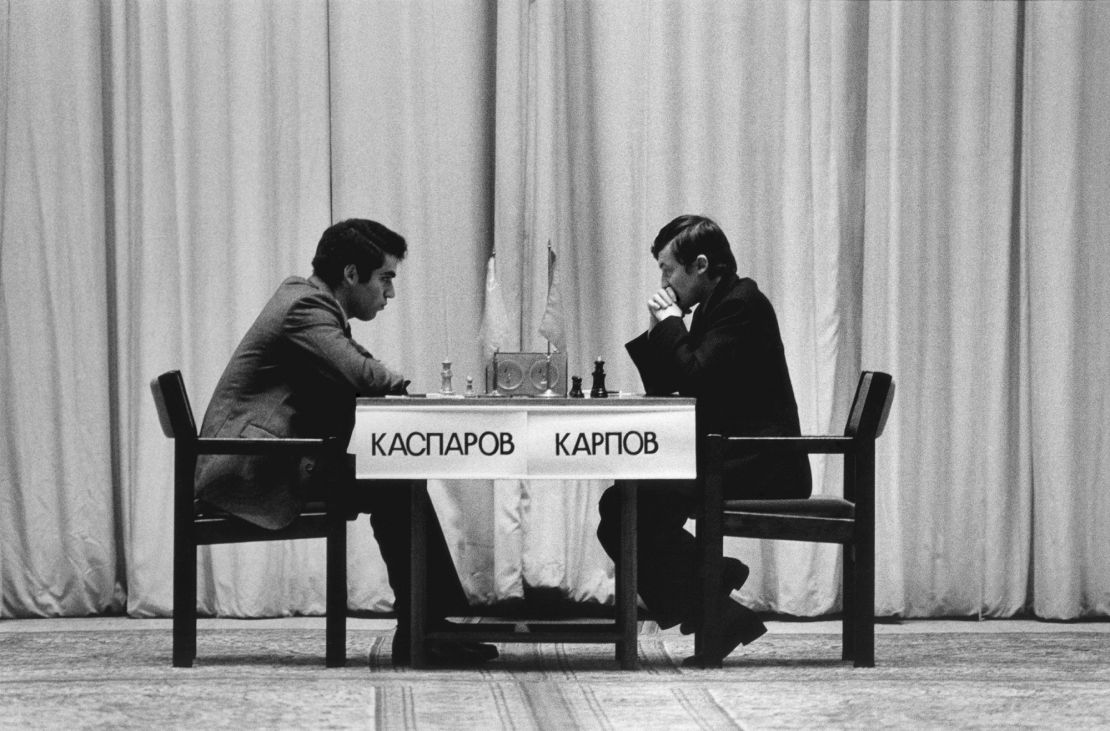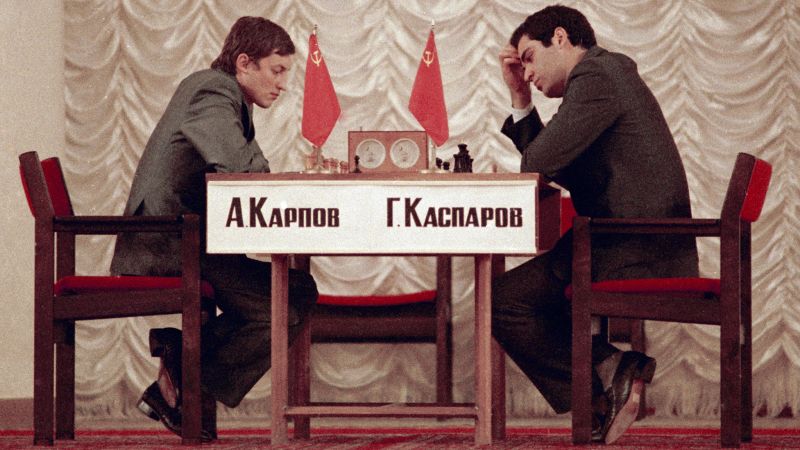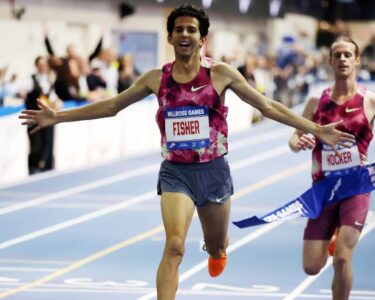Russian-born chess grandmaster and émigré Gennadi “Genna” Sosonko still remembers where he was 40 years ago today, when he heard that the 1984-85 World Championship match in Moscow between Garry Kasparov and Anatoly Karpov had been abandoned.
“I couldn’t come to the Soviet Union, of course. I was an enemy as (far as they were) concerned,” he says in an interview with CNN Sport. “I remember that day very well because I was in Switzerland, and I was together with (dissident and fellow grandmaster) Viktor Korchnoi, helping him to prepare for one of his own matches. We were listening to the Swiss radio, we were analyzing the opposition, when we heard that (FIDE President Florencio) Campomanes stopped the match. ‘Well, well, well, how is this possible?’”
The match had lasted five months, longer than any other World Championship before or since. Somewhere along the way, the contest had picked up some sort of symbolic value, an understanding that the result would reflect the future of the Soviet Union as a whole.
If Karpov won, it would be a sign of life for the old guard in a country which seemed to be slipping towards inevitable dissolution. If Kasparov won, it would be confirmation that times were changing, that something fresh and exciting and terrifying was coming.
But to be abandoned, without a winner, after 48 grueling games? What did that mean?
In terms of popularity, chess in the Soviet Union was akin to the NFL in the US.
“It was more than just a kind of sport,” says Sosonko. “Chess in Russia was a kind of religion. It was much more than just a game with 64 squares and 32 pieces.
“The names of Karpov, the names of (Mikhail) Tal, (Tigran) Petrosian and others were known by everybody, even the people who never played chess.”
The dominance enjoyed by Soviet players during the second half of the 20th century is hard to overstate. FIDE organized its first World Championship in 1948, and from then until the end of the century, 23 championship matches were played. Only one was not won by a Soviet or former-Soviet citizen – Bobby Fischer in 1972.
Under the likes of Nikita Khrushchev, Leonid Brezhnev and Yuri Andropov, the Soviet Union was well-known for its extensive use of propaganda, including the promotion of elite sportspeople like ice hockey star Vladislav Tretiak and soccer goalkeeper Lev Yashin.
With the Cold War bubbling away and the USSR looking for any opportunity to promote Soviet ideals on the world stage, chess players were no different. Their supremacy in the sport was fueled, in part, by the fact that they were looked after exceptionally well by the state.
“The conditions for the players were such that you couldn’t compare it with the tournaments in the West,” Sosonko recalls. “They had carte blanche in all restaurants, all hotels, unbelievable fees in dollars and hard currency. It was absolutely phenomenal in the Soviet Union.”
By the time 1984 came around, Karpov – a three-time world champion and a symbol of Soviet ideals – had been the prized asset for a decade.
“He was a really Russian guy from Ural, and he represented our country with glamor, with everything and so on,” explains Sosonko. “He was a god in Russia.”
As one of the few Soviet players who was able to play tournaments abroad and collect prize money in the local currency, Karpov was also “one of the richest people in the country,” according to Sosonko.
“He was one of the three or maybe four people in all of the Soviet Union who got a Mercedes car. One was Brezhnev, (singer Vladimir) Vysotsky, and the third one was Anatoly Karpov.
“The privileges that he got, you cannot imagine. He couldn’t compare with anybody in Russia.”
Kasparov, on the other hand, could not have been viewed more differently.
“He had a couple of weaknesses in the eyes of the big Party guys and the sport committee,” says Sosonko. “Namely, he was not a Russian, he was half-Jew and half-Armenian, and he came from Baku. The Soviet Union was very antisemitic.”
Despite having some ties to the Azerbaijani Communist Party’s First Secretary – and future president of Azerbaijan – Heydar Aliyev, the young challenger was not nearly as loyal to the Party as Karpov.
“Even at that time in the Soviet Union, everybody knew that Kasparov was young, ambitious. Not a dissident, but someone who was representative of the new wave,” says Sosonko. “His friends were actors, not dissidents – however, dissidents as well – but people who were not for the regime. (Whereas) Karpov was a really hard guard of the Soviet society at that time.”
Karpov’s conservatism and Kasparov’s radical nature were both present in their chess.
“There was something of a clash of titans here, in stylistic view,” Andrew Soltis, American grandmaster and chess historian, tells CNN Sport. “Kasparov represented a more aggressive, dynamic style.
“He was a contrast with Karpov, who was somewhat more conservative. He played a waiting game often. He specialized in improving his position gradually until it became overwhelming. Karpov rarely won a game in fewer than 30 moves. Kasparov reveled in winning games very quickly.
“No one was indifferent. You were either a Karpov fan or a Kasparov fan. There was no middle ground.”
Played under the competition’s old rules, where the champion is the first to win six games and draws are worth nothing, the 1984 World Chess Championship began on September 10.
Nine games and 25 days in, Karpov had established a seemingly unassailable 4-0 lead. As Kasparov began to get more of a handle on the match, the next 17 games were drawn, before Karpov won again in game 27 to put himself one win away from victory.
But the champion was not playing like he had been at the start of the match. He had started to make mistakes and, in game 32, Kasparov finally notched a victory.
“Karpov thought that he could win the match just by sitting back and waiting for his opponent to blunder, and that may have worked at the beginning, but Kasparov recovered remarkably. He didn’t emotionally collapse the way many of Karpov’s opponents did,” explains Soltis. “Eventually, the strain got to Karpov and he began to make really bad moves. He became unnerved.”
The next 14 games were tied, but in games 47 and 48, Kasparov won two in a row to pull the score back to 5-3.
Suddenly, Karpov was floundering. Was his opponent really about to come back and win the match?
“Definitely, the momentum had shifted to Kasparov,” says Soltis. “I think he would probably have at least gotten to a situation where they both had five victories. And the final, if that happened, I would have bet heavily on Kasparov. I think that Karpov had become a shell of the player that he once was.
“The Karpov that began that match in 1984 was not the Karpov that ended the match in 1985.”
The intensity of the situation was apparently getting to the reigning champion, who lost 22 pounds over the course of the match.
“Karpov was obviously getting very tired. He was exhausted. He wasn’t sleeping well. According to his aides, he was getting to sleep at midnight early in the match, and then it was 2 a.m. and then it was 4 a.m. He was clearly getting weaker and weaker,” says Soltis.
“(He) wasn’t very heavy to begin with. He’s a small guy, relatively, and he was just wasting away.”
It was at this point, with Kasparov apparently having turned the tide and both players keen to continue, that Campomanes took one of the most infamous decisions in chess history.
He flew to Moscow and, citing the health of the players, announced that he was abandoning the match. The ruling, he added, was supported by the Soviet Chess Federation.
In the 40 years since, there has never been a definitive answer as to whether Campomanes – who has since been referred to as “Karpovmanes” in some circles – had any ulterior motive when he made the decision.
In Sosonko’s mind, the reasoning is clear. “FIDE, the international chess organization, was completely under the influence of the Soviet Union,” he says. “We knew, of course, that Campomanes was on the side of the Soviets.”
When contacted for comment, current FIDE CEO Emil Sutovsky told CNN that Sosonko’s claims were “rather inaccurate.” While admitting that the Soviets did have a lot of influence, he pointed out that there was a lot of tension between FIDE and the USSR Chess Federation, particularly between 1983 and 1985.
There have even been suggestions from some that Campomanes, who passed away in 2010, was an agent of the KGB, an argument Sosonko believes is an oversimplification.
“‘KGB agent’ is a hard definition – that he got some money or some instructions. I don’t think so. But he was on the Soviet side, in all aspects,” he says.
Soltis points out that Campomanes had previously taken decisions in other tournaments that had hindered Soviet players and calls the notion that Campomanes was KGB “absurd.” However, he does also believe that decisions throughout the match seemed to favor Karpov.
“The postponements, I think, were the critical point here,” he explains. “Normally, players can ask for a postponement of a game in those days because of illness, and the players had exhausted their number of days they could take. And then there were these mysterious postponements that the government or the chess officials ordered.
“There was no real explanation. So there was this invisible hand that was benefiting Karpov.”
There was, recalls Soltis, a shift in the FIDE President’s reputation during the match: “At one point, it seemed like Campomanes was standing firm, that he was an enemy of the Soviets.
“But during this match, the perception changed, and it would seem that Campomanes was actually playing a double game. He was really helping Karpov, he was helping the Soviet Chess Federation which really wanted to get this thing over with, and he was trying to find a solution.
“Nobody knows what’s going on in Campomanes’ mind, and he’s dead now, so he’ll never tell.”
While the answer to this specific question is likely to be lost to history, what has happened since will inevitably inform how 1984-85 is viewed.

Kasparov won the rematch later that year, then beat Karpov again in each of the next three World Championships, and is now known as one of the greatest players ever. Perhaps even more crucially though, present-day Russia is using sports to promote its interests throughout the world.
“I think the Russians are trying to use sports as a political weapon. I think that’s definitely true: a leopard can’t change its spots,” says Soltis.
“(Russian President Vladimir) Putin is, well, a former KGB agent,” he continues. “Nowadays, with the sports boycott of the Russians, they’re in a very difficult position, and they’re trying to claw their way back into chess, and into sports in general.
“(In the Soviet Union) they were using sports and chess which, of course, is considered a sport in Russia and always will be, for their own benefit. And I suspect you’re going to see this for many years to come.”






